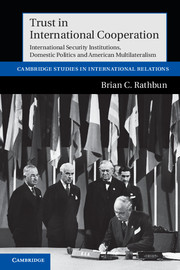 Trust in International Cooperation
Trust in International Cooperation Book contents
- Frontmatter
- Contents
- Preface
- 1 Circles of trust: reciprocity, community and multilateralism
- 2 Anarchical social capital: a social psychological theory of trust, international cooperation and institutional design
- 3 The open circle: the failure of the League of Nations
- 4 Squaring the circle: the birth of the United Nations
- 5 Closing the circle: the negotiation of the North Atlantic Treaty
- 6 Coming full circle: fear, terrorism and the future of American multilateralism
- Works cited
- Index
3 - The open circle: the failure of the League of Nations
Published online by Cambridge University Press: 05 June 2012
- Frontmatter
- Contents
- Preface
- 1 Circles of trust: reciprocity, community and multilateralism
- 2 Anarchical social capital: a social psychological theory of trust, international cooperation and institutional design
- 3 The open circle: the failure of the League of Nations
- 4 Squaring the circle: the birth of the United Nations
- 5 Closing the circle: the negotiation of the North Atlantic Treaty
- 6 Coming full circle: fear, terrorism and the future of American multilateralism
- Works cited
- Index
Summary
The League of Nations was a revolutionary attempt at international cooperation. Forever associated with its primary proponent, the American President Woodrow Wilson, the organization called on members to submit all of their disputes to some form of international conflict resolution before resorting to force and specified sanctions if they failed to comply. The institution's constitution, the Covenant, also contained a moral pledge promising that each member would come to the aid of other members so as to preserve their political independence and territorial integrity. The League's scope was to be global, encompassing most of the states of the world. The Covenant was negotiated with difficulty at the Versailles peace conference, only to be brought home by Wilson and defeated in the US Senate by those who believed it was a dangerous infringement of American sovereignty. The United States, whose president was the most strident advocate of the League of Nations, never joined. Ever since, scholars have contemplated the counterfactual of whether, had the United States been a part, the League for all its weaknesses might have served as an effective deterrent against Nazi aggression.
Rationalists have difficulty explaining Wilson's vision. Both in its dispute resolution mechanisms and its security guarantee, collective security rested on diffuse reciprocity among a large group of members with very different interests. Strategic trust cannot sustain qualitative multilateralism. Entrapment, abandonment and exploitation were all significant risks. Yet the Covenant bringing about the organization created no real supranational hierarchy to prevent opportunism. Lake concludes that for this reason it failed to garner the requisite American support in the Senate for ratification, but this begs several questions. How was Wilson able to make such a proposal in the first place and why did it garner such support in his Democratic Party? How could its supporters believe that the League would work? Rationalism also cannot account for why the League caused so much domestic division given that the primary opponents in the internal political struggle had the same set of interests and the same information.
- Type
- Chapter
- Information
- Trust in International CooperationInternational Security Institutions, Domestic Politics and American Multilateralism, pp. 57 - 109Publisher: Cambridge University PressPrint publication year: 2011


